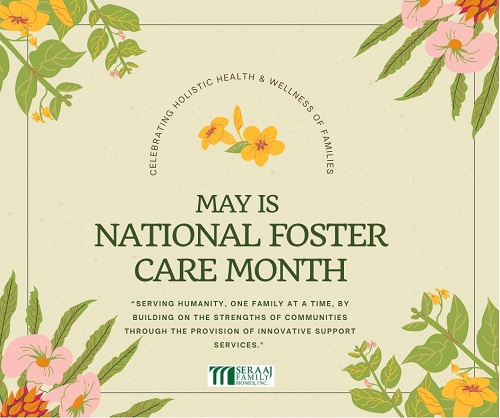By Abdul Seraaj, CEO of Seraaj Family Homes, Inc. | Edited by Intisar Seraaj
Keeping within our theme for this month—as May is National Foster Care Month—we want to spread awareness of how our foster parents view the benefits of fostering children. Firstly, we refer to our foster parents as “professional family teachers” (PFTs) because they take their responsibilities seriously, teaching their child(ren) independent living skills, being involved with their treatment plans, consistently training and learning helpful parenting and health skills, and more. One of the greatest benefits of fostering is within the realm of holistic health and wellness. The majority of our PFTs can articulate specific health benefits and healing effects that fostering has had on them.
Many of our PFTs have shared with me that before they brought a child in foster care into their home that they were depressed, suffering from empty nest syndrome, or loneliness. I’ve heard from many of our PFTs that after retiring from their primary careers, they found themselves unable to get out of bed due to depression. Some said they did not have a sense of motivation or purpose in life anymore.
Not only does Seraaj Family Homes, Inc. (SFH) have many retired PFTs but we also have a significant number of foster parents who are widows. After losing their husbands, they decide to foster. It is amazing to see the healing that happens between a widowed PFT and a child in foster care, specifically who is an orphan. The majority of our widowed PFTs end up adopting their foster child(ren). Our agency is currently collecting data and doing research to determine the significant outcomes of this kind of paring within foster care.
Many of our PFTs also have dealt with health issues like cancer, diabetes, obesity, infertility, and depression, and some have experienced the loss of a biological child. Some say, after fostering a child or a sibling group, their cancer and diabetes went away due to lifestyle changes, largely due to having to be more active to keep up with their foster child(ren) or having a new purpose.
These selfless individuals we call PFTs not only open their homes to youth in foster care but also open their hearts and lives to children in need. SFH PFTs are committed to proving foster care services until they’re physically unable. They are passionate about providing quality care to our youth in foster care. The majority of our PFTs do not even want an official respite break.
I make PFT home visits throughout all the company’s regions with the purpose of showing them appreciation and acknowledgment. I’m continuously amazed when I visit our PFT homes at how they appreciate SFH for positively impacting their lives by placing foster children in their lives and homes. Even our PFTs who’ve adopted continue to foster afterward. The majority of Seraaj PFTs foster children until their deaths.
One of the most amazing and reoccurring themes among these caregivers is the pride and long-term commitment they all have for the important work they do. Our staff is encouraged to match this commitment and keep it in the forefront as a standard business practice. Some of our PFTs have been with the company for 10 years, 20 years, or more.
The agency even has “legacy groups,” in which our foster parents and their biological children have both fostered through SFH. We have foster parents that have encouraged their loved ones to foster. As a result, they have created a generation of professional caregivers and healers. SFH has several mother-daughter PFT duos. We also have biological siblings who foster together and multiple biological family member PFT collaborations where they are all licensed foster parents and provide each other with respite care. These kinds of recruitment efforts can only happen if our current PFTs feel they can depend on our services and if they feel appreciated and publicly acknowledged. We must nurture this kind of legacy.
This is true stability that also creates stable employment for a variety of positions. In essence, foster parents are an agency’s employers. For example, if no customers showed up in a drive-thru, even the best fast-food restaurant would fold. Without our customers, we fail. Our foster parents are the most significant variable to the company’s financial wellbeing and profit-sharing abilities. If our employees do not take care of our PFTs and youth in care, we will all be out of a job. Our PFTs and foster children create jobs and maintain job security for everyone at SFH. If we are not participating in the highest quality of service delivery to our PFTs, then we are working against our mission and goals.
Throughout the agency’s existence, several of our regions have closed or were forced to merge with another region as a result of failing to diligently provide consistent quality customer service to our PFTs. Those regions that dissolved had established a lackadaisical culture of providing poor case management, poor family support services, and no 24-hour crisis response to support the families in its region.

The more foster parents we recruit and provide excellent customer service to, the more jobs we create and the more job stability we have. | Photo by Alex Green from Pexels
To drive this message home, consider how a PFT who accepts a child with special needs creates at least two full-time case manager jobs and one or two family support worker jobs. Everywhere that SFH develops clusters of PFT homes, consisting of at least four to six foster youth with special needs, we create at least three to four full-time jobs. Another example is: Anywhere that SFH develops a cluster of PFTs homes with eight to 16+ therapeutic foster children, will create another region with two case manager jobs and one licensing social worker job. The more PFT homes we develop, the more jobs the company is able to create. The more PFTs accept new placements, the more job security there is for everyone who’s employed by SFH. If we filled 80% of our vacant PFT homes, what would be the job creation impact for each region? If we could decrease placement disruptions by 80%, what would be the job creation impact? Our PFTs have proven themselves to be the best resource for recruiting other parents to the SFH team.
To achieve our highest growth potential, we must hire, train, and retain staff members who are committed to practicing and implementing our core values of honesty, integrity, flexibility, accessibility, accountability, accuracy, and responsiveness. When we give our all to recruiting, retaining, acknowledging, and motivating our current PFTs to recruit other new PFTs, we are working for ourselves and strengthening our own financial futures.
We must maintain the highest level of service in our industry. There is no other option. By not providing the highest quality of customer service delivery to our PFTs, foster kids, and DHR customers, we are all but guaranteeing failure. This is unacceptable. Historically, SFH built its service delivery methodology on providing the highest quality of services based on its staff personnel being available 24/7. SFH never closes. We have solidified our place in the human service marketplace by being the one agency that can be called upon to deliver unconditional foster care services. This must once again and forever be our standard of service delivery. We shall and should be known as the agency that will get the job done!


